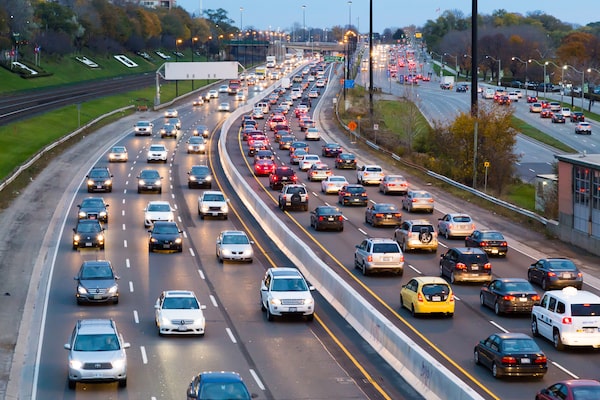
A view of traffic on the Gardiner Express at rush hour. In a new study, researchers followed 180 permit winners and 757 losers for roughly five years, and looked for differences caused by the acquisition of a car.iStockPhoto / Getty Images
When researchers in New Zealand published a study last month showing that bike commuters live longer than car commuters, the reactions were pretty muted.
It was a good study, drawing on almost five million responses from census data and correcting for differences in age, income, education, neighbourhood and other potential confounding factors. But despite these efforts, it was hard to shake off the nagging feeling that people who choose to bike to work might be different from those who drive in difficult-to-quantify ways that also influence their health through other pathways.
To really establish that driving hurts your health, in other words, you need a randomized trial. But who’s going to assign long-term car ownership on the basis of a coin flip?
The city of Beijing, it turns out. Because of mounting congestion, Beijing has limited the number of new car permits it issues to 240,000 a year since 2011. Those permits are issued in a monthly lottery with more than 50 losers for every winner – and that, as researchers from the University of California Berkeley, Renmin University in China and the Beijing Transport Institute recently reported in the British Medical Journal, provides an elegant natural experiment on the health effects of car ownership.
Led by Berkeley economist Michael Anderson, the researchers followed 180 permit winners and 757 losers for roughly five years, and looked for differences caused by the acquisition of a car.
“The randomization of the lottery is what gives us confidence,” Anderson explained in a statement. “We know that the winners should be comparable to the losers on all attributes other than car ownership.”
Not surprisingly, the winners took 2.9 fewer rides a week on Beijing’s dense public-transit network, representing a 45-per-cent drop in usage. They also spent 24.2 fewer minutes each day day walking or biking than the non-winners, a 54-per-cent drop.
You’d expect these behaviour changes to have health impacts. Over all, the winners gained an average of just more than two kilograms, a difference that was not statistically significant. But the effects were more obvious when looking only at winners aged 50 or older: They gained an average of 10.3 kilograms, a statistically significant and worrisome increase.
The results are consistent with a stack of previous studies that have found that car owners tend to weigh more than non-owners. The New Zealand census data, which were published in the International Journal of Epidemiology, make an even stronger case, since they link commuting mode to the most unambiguous health indicator possible: death.
But the randomized assignment of cars in Anderson’s Beijing cohort finally shows that it’s the car itself, not simply being the type of person who wants a car, that influences behaviour and ultimately health.
That’s not surprising – and it’s not unique to cars. “In most cases, comfort – like most things – involves trade-offs,” says Daniel Lieberman, an evolutionary anthropologist at Harvard University. “So they aren’t good or bad; they simply have costs and benefits.”
Natural selection has left us wired to seek ways of saving energy that we can devote instead to reproduction, regardless of whether those choices make us healthier, Lieberman says, so it’s natural to default to the elevator instead of the stairs, and to use your car if you’ve got one. Overcoming these habits requires deliberate effort – or engineering your environment to make the alternatives easier to choose.
To Anderson, that suggests that “demand management” schemes for cars in cities, such as congestion fees, tolls and pedestrian-only zones, make sense.
“The public-health impacts of automobile travel are really important,” he says. “While cars have saved trillions of hours of travel time globally, they’ve also likely shortened lifespans by trillions of hours in aggregate via traffic accidents, pollution and obesity-related disease.”
Alex Hutchinson is the author of Endure: Mind, Body, and the Curiously Elastic Limits of Human Performance. Follow him on Twitter @sweatscience.
Live your best. We have a daily Life & Arts newsletter, providing you with our latest stories on health, travel, food and culture. Sign up today.